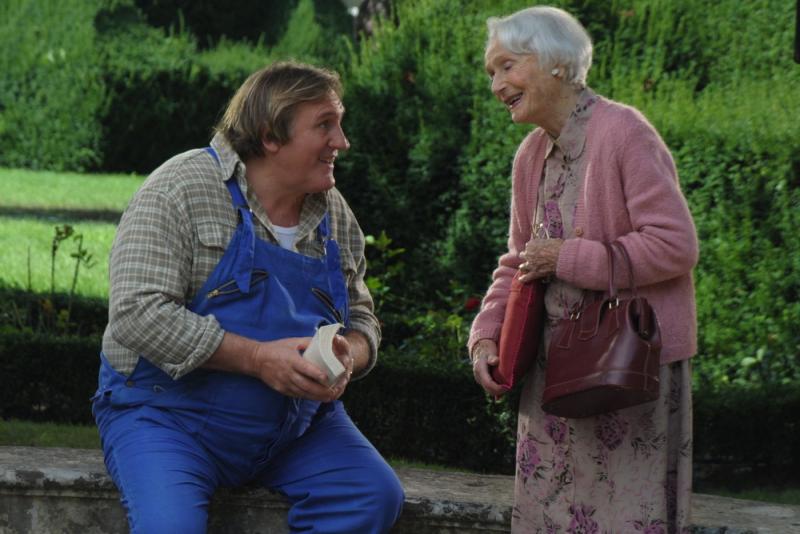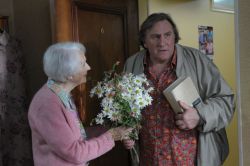My Afternoons with Margueritte | reviews, news & interviews
My Afternoons with Margueritte
My Afternoons with Margueritte
Barely literate bumpkin meets intellectual old lady in provincial love story

These days Gérard Depardieu looks as though he wouldn't need much padding to play Obélix again. Though he continues to work with some of the biggest names in French cinema, it has been a while since he really surprised us, maybe because he's now such a familiar presence; in 2010 alone, he took on no less than five leading roles and a couple of walk-ons.
The French title of Jean Becker's film is La tête en friche, which roughly means (agricultural metaphor alert) a fallow head, ripe for planting. The head in question belongs to Depardieu as Germain, an unmarried bumpkin in dungarees who is teased by his acquaintances for his lack of schooling, though - typically French - he's not such a loser that he doesn't have lovely young bus-driver Sophie Guillemin for a girlfriend.
 The film is essentially a love story, but it's not so much about that particular relationship, nor about the one between the man-mountain and his brassy chain-smoking mother, whose careless, sometimes cruel approach to child-rearing is shown in flashback. It's more about the affection which springs up between him and Margueritte, a sharp-witted and extremely well-read nonagenarian he meets and gets to know in the park.
The film is essentially a love story, but it's not so much about that particular relationship, nor about the one between the man-mountain and his brassy chain-smoking mother, whose careless, sometimes cruel approach to child-rearing is shown in flashback. It's more about the affection which springs up between him and Margueritte, a sharp-witted and extremely well-read nonagenarian he meets and gets to know in the park.
Margueritte is played by Gisèle Casadesus, a spry and still beautiful 96-year-old veteran who made her film debut in 1934 in Marcel L'Herbier's L'aventurier, and one of the pleasures of Becker's film is being able to feast your eyes on a face like hers, which has an entire lifetime etched into its lines. Like all such movie bonding between ostensibly mismatched characters, their relationship is a two-way street - she encourages him to work on his shaky reading skills by getting him interested in Albert Camus and Romain Gary, while he...
But that would be giving too much away. Suffice to say, while this tugs shamelessly at the heartstrings and occasionally indulges in a sort of wishful thinking which strains credibility, it never descends into Driving Miss Daisy-style pathos. The love story is not just about the close friendship between Germain and Margueritte, but about the love of reading and literature in general. Which is nice, because it's not often that one comes across films extolling the joys of literacy.
 Director and co-screenwriter Becker is the son of film-making legend Jacques Becker, one of only a very few members of the French "old guard" whose films were accorded a measure of respect by proponents of the New Wave, who in the late 1950s derisively dismissed all the rest as, "le cinéma de papa".
Director and co-screenwriter Becker is the son of film-making legend Jacques Becker, one of only a very few members of the French "old guard" whose films were accorded a measure of respect by proponents of the New Wave, who in the late 1950s derisively dismissed all the rest as, "le cinéma de papa".
Becker fils has sporadically nudged the outside of the envelope of respectability with slightly outré fare such as One Deadly Summer (Isabelle Adjani in full-on slutty avenger mode), Élisa (inspired by a Serge Gainsbourg song, and again starring Depardieu) and the spiky Deux jours à tuer (which never came out in the UK, though the French DVD has English subtitles if anyone's interested). But more recently, in Les enfants du marais, Conversations with My Gardener, and now My Afternoons with Margueritte, he also seems to have been perfecting a latterday variation on "cinéma de papa", celebrating traditional France, its unspoiled countryside, old-fashioned film-making values and status quo. Cultivons notre jardin, indeed.
Watch the trailer to My Afternoons with Margueritte
Explore topics
Share this article
The future of Arts Journalism
You can stop theartsdesk.com closing!
We urgently need financing to survive. Our fundraising drive has thus far raised £49,000 but we need to reach £100,000 or we will be forced to close. Please contribute here: https://gofund.me/c3f6033d
And if you can forward this information to anyone who might assist, we’d be grateful.

Subscribe to theartsdesk.com
Thank you for continuing to read our work on theartsdesk.com. For unlimited access to every article in its entirety, including our archive of more than 15,000 pieces, we're asking for £5 per month or £40 per year. We feel it's a very good deal, and hope you do too.
To take a subscription now simply click here.
And if you're looking for that extra gift for a friend or family member, why not treat them to a theartsdesk.com gift subscription?
more Film
 theartsdesk Q&A: actor Leonie Benesch on playing an overburdened nurse in the Swiss drama 'Late Shift'
The Guildhall-trained German star talks about the enormous pressures placed on nurses and her admiration for British films and TV
theartsdesk Q&A: actor Leonie Benesch on playing an overburdened nurse in the Swiss drama 'Late Shift'
The Guildhall-trained German star talks about the enormous pressures placed on nurses and her admiration for British films and TV
 Freakier Friday review - body-swapping gone ballistic
Lindsay Lohan and Jamie Lee Curtis's comedy sequel jumbles up more than their daughter-mother duo
Freakier Friday review - body-swapping gone ballistic
Lindsay Lohan and Jamie Lee Curtis's comedy sequel jumbles up more than their daughter-mother duo
 Eight Postcards from Utopia review - ads from the era when 1990s Romania embraced capitalism
Radu Jude's documentary is a mad montage of cheesy TV commercials
Eight Postcards from Utopia review - ads from the era when 1990s Romania embraced capitalism
Radu Jude's documentary is a mad montage of cheesy TV commercials
 The Kingdom review - coming of age as the body count rises
A teen belatedly bonds with her mysterious dad in an unflinching Corsican mob drama
The Kingdom review - coming of age as the body count rises
A teen belatedly bonds with her mysterious dad in an unflinching Corsican mob drama
 Weapons review - suffer the children
'Barbarian' follow-up hiply riffs on ancient fears
Weapons review - suffer the children
'Barbarian' follow-up hiply riffs on ancient fears
 theartsdesk Q&A: filmmaker Dag Johan Haugerud on sex, love, and confusion in the modern world
The writer-director discusses first-love agony and ecstasy in 'Dreams', the opening UK installment of his 'Oslo Stories' trilogy
theartsdesk Q&A: filmmaker Dag Johan Haugerud on sex, love, and confusion in the modern world
The writer-director discusses first-love agony and ecstasy in 'Dreams', the opening UK installment of his 'Oslo Stories' trilogy
 Oslo Stories Trilogy: Dreams review - love lessons
First love's bliss begins a utopian city symphony
Oslo Stories Trilogy: Dreams review - love lessons
First love's bliss begins a utopian city symphony
 Blu-ray: Two Way Stretch / Heavens Above!
'Peak Sellers': two gems from a great comic actor in his prime
Blu-ray: Two Way Stretch / Heavens Above!
'Peak Sellers': two gems from a great comic actor in his prime
 Late Shift review - life and death in an understaffed Swiss hospital
Petra Volpe directs Leonie Benesch in a compelling medical drama
Late Shift review - life and death in an understaffed Swiss hospital
Petra Volpe directs Leonie Benesch in a compelling medical drama
 The Naked Gun review - farce, slapstick and crass stupidity
Pamela Anderson and Liam Neeson put a retro spin on the Police Squad files
The Naked Gun review - farce, slapstick and crass stupidity
Pamela Anderson and Liam Neeson put a retro spin on the Police Squad files
 theartsdesk Q&A: actor Lars Eidinger on 'Dying' and loving the second half of life
The German star talks about playing the director's alter ego in a tormented family drama
theartsdesk Q&A: actor Lars Eidinger on 'Dying' and loving the second half of life
The German star talks about playing the director's alter ego in a tormented family drama
 The Fantastic Four: First Steps review - innocence regained
Marvel's original super-group return to fun, idealistic first principles
The Fantastic Four: First Steps review - innocence regained
Marvel's original super-group return to fun, idealistic first principles

Add comment